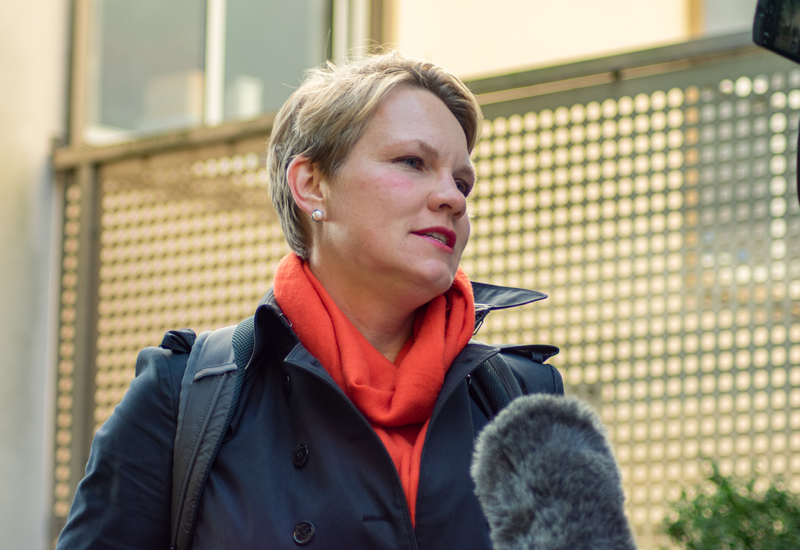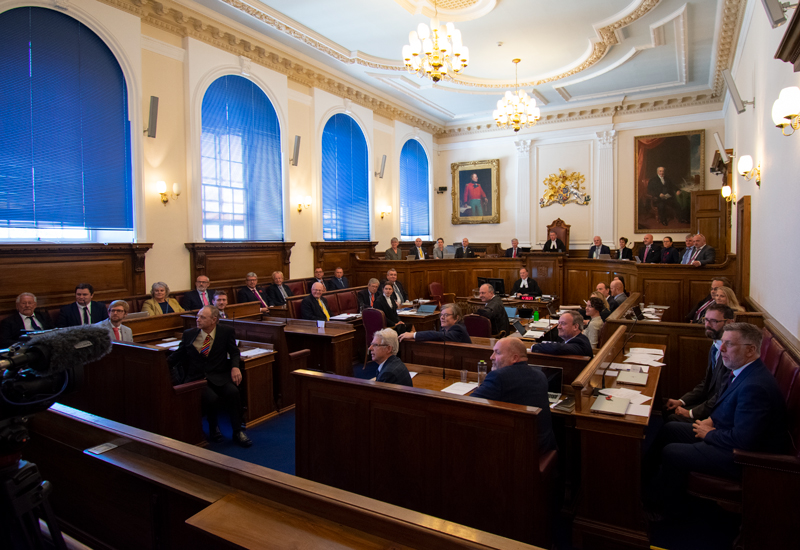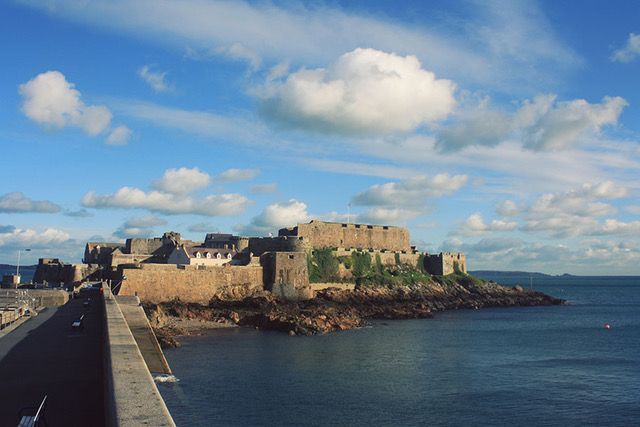

Some deputies are urging caution about what could be achieved by a development agency which the Policy & Resources Committee wants the States to set up to drive investment along the island’s east coast.
If the States agree – possibly at the end of March – the agency would be set up as a States-owned company but with a board independent of deputies.
Deputy Victoria Oliver, President of the Development & Planning Authority, expects the proposals to be approved by the States. But she said there was a big difference between the States setting up a development agency and getting large-scale infrastructure projects off the ground.

Pictured: Deputy Victoria Oliver thinks the States will back the Policy & Resources Committee's proposals to set up a development agency.
“In my previous working life, I have seen some development agencies that have worked well and some that haven’t,” said Deputy Oliver.
“I personally think it all depends on the relationship that occurs and how open they are. I am slightly worried who will be on the development agency as that will either make it or break it.
“The obstacles will still be there even though it would be one removed from the States. The consistency over time will be of great benefit [but] the timescales that are in the policy letter are very tight.”
Deputy Oliver can see merit in the idea of a development agency even if its role may end up being more limited than the Policy & Resources Committee’s proposals might suggest.
“They are normally used for larger projects that need a lot of communication and need to involve local planning briefs. Their main goal should be to help develop and support the States and improve the area in question.”
The proposals put forward by the Policy & Resources Committee suggest that the development agency would have a high degree of independence from the States. But it would be overseen by a new group of three politicians – the Policy & Resources Committee’s treasury lead (currently Deputy Helyar) and the Presidents of the Committee for Economic Development (currently Deputy Neil Inder) and the Committee for the Environment & Infrastructure (currently Deputy Lindsay De Sausmarez) – although it is not yet clear how the agency or the oversight group would be accountable to the States’ Assembly, if at all.

Pictured: Deputy Sasha Kazantseva-Miller approves of the principle of a regeneration or development agency but has several questions about the Policy & Resources Committee's current proposals which she hopes it will answer before the States debate them, probably at the end of March.
Deputy Sasha Kazantseva-Miller supports the principle of a development agency but has some concerns about how the Policy & Resources Committee wants to set it up.
“I advocated for the establishment of a regeneration board in my election manifesto and so I am supportive of approaches to improve the delivery mechanisms for Guernsey's investment into the infrastructure,” said Deputy Kazantseva-Miller.
“However, this needs to be done with clear governance and transparency mechanisms, so we do not end up with the risk of selling valuable States’ assets or privatisation by the backdoor.
“There is also a lack of clarity about how some of the development schemes may be financed and what the approval mechanisms may be for that. The Manx Development Corporation [in the Isle of Man], which is extensively quoted in the policy letter, seeks approvals for funding from the shareholder.”
Deputy Kazantseva-Miller also warned that any development agency may be limited without clear strategic direction from the States about the future of the harbours.

Pictured: Deputies declined to agree strategic plans for the island's harbours when they last debated the issue in 2021.
“The most important determinant of the development of the eastern seaboard is what happens with the Harbours,” she said.
“The policy letter provides little clarity about exactly how the future harbours development would be undertaken, at what point and by which body.
“The policy letter for the development agency came out of an amendment during the debate on the future of the harbours and that remains a central question to be addressed.
“This policy letter also calls for a transfer of assets from the ports for its own management and this makes the future financial sustainability of the ports unclear.”
Deputy Kazantseva-Miller said she would seek further clarity about these issues before the States debate and vote on setting up the development agency.
Deputy Peter Roffey, President of the States’ Trading Supervisory Board, which runs the States’ trading assets, including the ports, said he was “tentatively supportive” of the proposals put forward. “But not with the expectation they will achieve the ambitions set out in the policy letter – although I hope to be proved wrong,” he said.
Deputy Roffey said “the $64,000 question” was what type of projects the development agency would drive forward and where.

Pictured: In arguing for a development agency to run large parts of Guernsey's east coast, the Policy & Resources Committee refers to a similar development agency which has radically altered the skyline of St. Helier in Jersey in recent years.
“Unlike the situations quoted [in the policy letter] in Jersey and the Isle of Man, Guernsey does not own big tracts of land along the seafront which to a development agency are key to utilising in profitable ways which also benefit the whole community,” said Deputy Roffey.
“Indeed, beyond the South Esplanade/bus station, North Plantation, Visitor Centre, Castle Cornet and parts of the piers, I am struggling to think what assets they will control.
“This does make me concerned that these constraints might lead them to pursuing utterly unacceptable and undeliverable projects such as reclaiming Belle Greve Bay or turning a large part of Castel Cornet into a hotel.
“I hope I am proved wrong. The other issue I am unclear about is whether they will have any role in the much-needed development of our commercial ports – as per a recent States’ Trading Supervisory Board policy letter – or whether that is being left to the Committee for the Environment & Infrastructure under the “I” part of its mandate or whether the whole idea has yet again been quietly parked for another generation. I look forward to clarity on this matter.”

Pictured: Deputy Peter Roffey hopes that any development agency set up by the States will steer clear of "utterly unacceptable" projects such as turning Castle Cornet into a hotel.
Deputy Roffey said he did not have concerns about the States’ Trading Supervisory Board being undermined by a development agency set up to run much of the east coast.
He said any such difficulties could be overcome “with goodwill and common sense”.
Comments
Comments on this story express the views of the commentator only, not Bailiwick Publishing. We are unable to guarantee the accuracy of any of those comments.